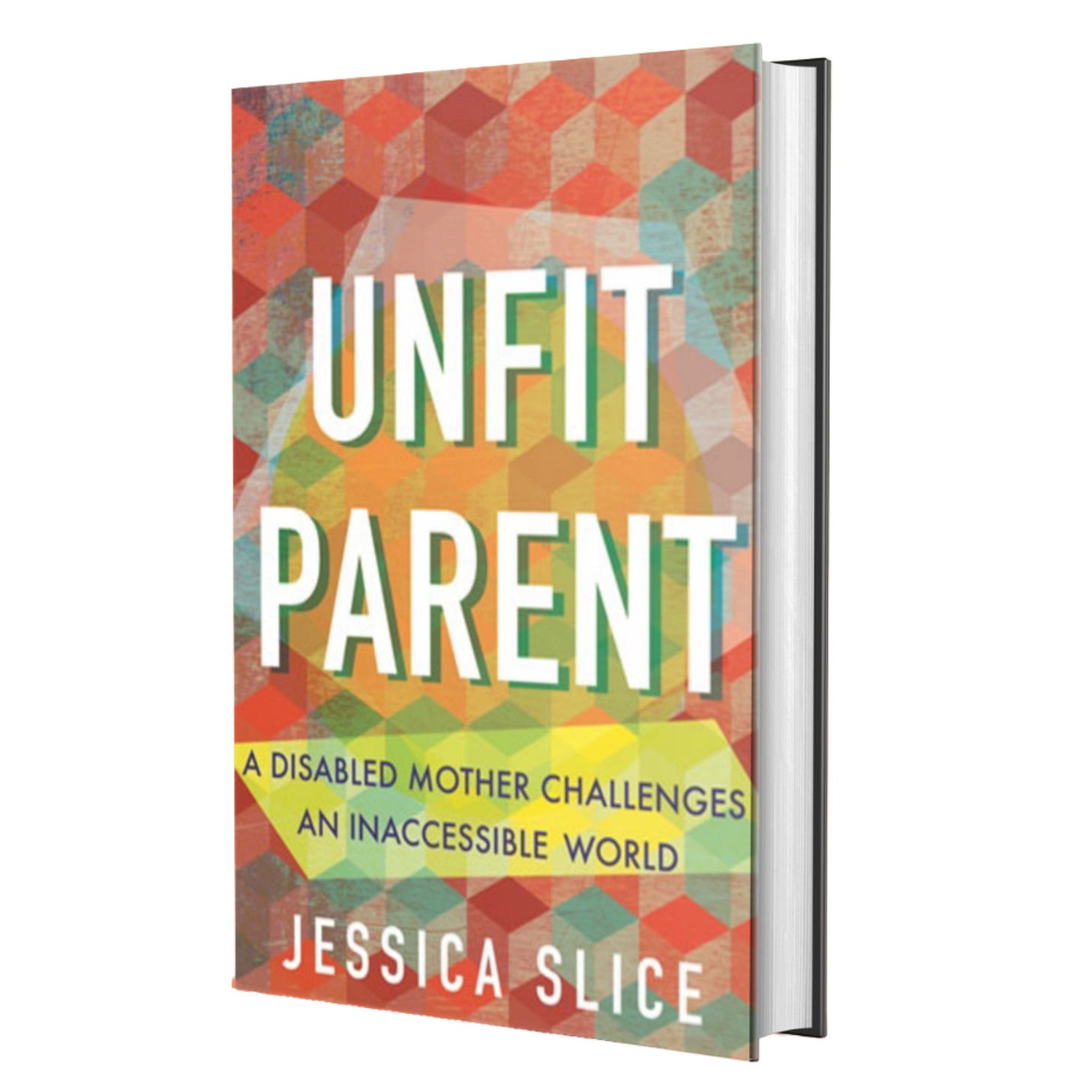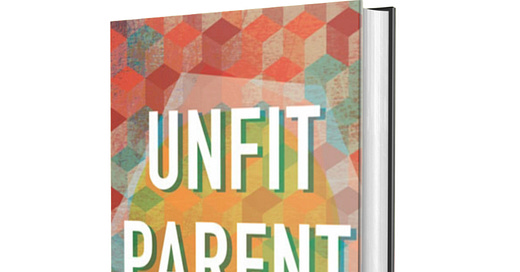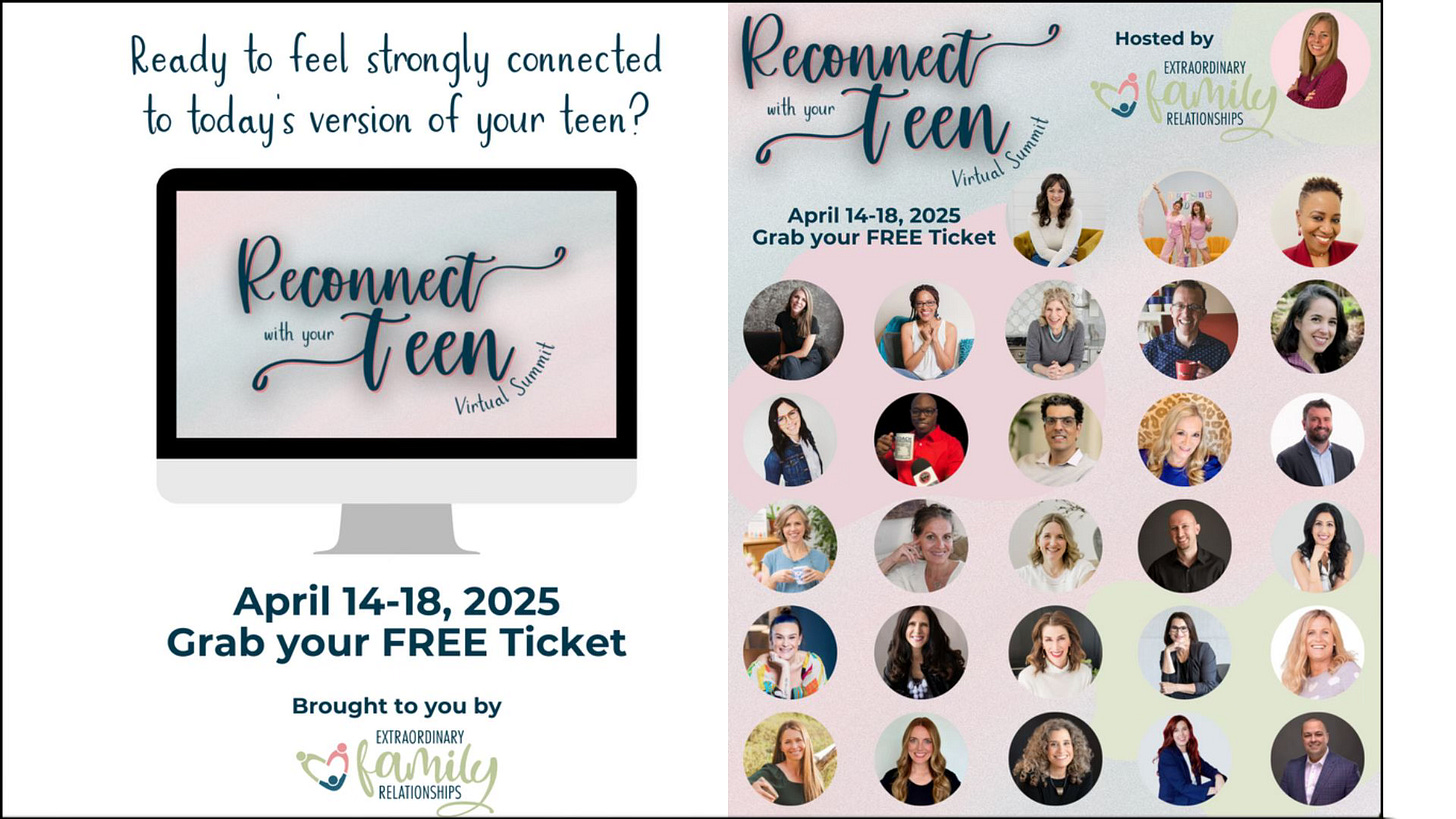Unfit Parent: Lessons from Disability Culture on Parenting and the Good Life
A Q&A with author Jessica Slice
Pssst — The FREE Reconnect with Your Teen Virtual Summit is starting soon! Read more about it at the end of this newsletter.
When
reached out to me about her new book, Unfit Parent: A Disabled Mother Challenges an Inaccessible World, I was busy and, honestly, a little weary of taking on more 'work'—by which I mean just reading an advance copy.But the premise grabbed me: what if being a parenting couldn’t hinge on perfection, hustle, and pretending everything comes with ease? How would the experience of being a mom change if you could—or must—disentangle your worth from the culture of productivity?
So I said yes.
After all, much of what we talk about in this newsletter are the impossible expectations placed on mothers—and how absurdly little support we’re given to meet those expectations. Slice, as a disabled mother navigating those same pressures with a different lens, had something important to say.
And Unfit Parent delivered.1
It’s smart, accessible, and eye-opening. It shows how disabled people are often uniquely equipped to parent—and it forces us to ask: what does it mean to raise kids in a world that’s afraid of weakness and repulsed by vulnerability?
As Slice puts it in the book, “Disability culture reframes the wider culture. It teaches creativity and acceptance. It rejects rabid capitalism and embraces mutual aid. It encourages rest. Just imagine what it would be like to parent in a society where parenthood didn’t mean perfection and loneliness.”

Jessica, Unfit Parent is a powerful and essential read for parents with disabilities—or anyone with a disability who is considering parenthood. But what really strikes me as I read it, is how pertinent the wisdom in the book is for any parent facing the challenges of unpredictable routines, lack of sleep, guilt, decision fatigue, etc. You write, “If nondisabled parents entered that first week [with their newborn] with a disability-informed understanding of what makes life good, what an individual’s efforts can yield, and the fragility of all bodies, perhaps those first seven days would not feel as destabilizing. The dream of perfection corrodes.” Can you say more?
The book really explores how disabled parenting strategies can offer an off-ramp for all parents. For example, disabled parenting rejects the premise that we should be able to make this work on our own. All parents benefit from community and help! Also, disabled people are often the canaries in the coal mine, and our experiences highlight what feels so unsustainable about contemporary parenting.
The stories in the book, and particularly your personal journey, are what make the book so readable. You’ve had a very interesting path to becoming a parent. Can you talk a little bit about that?
Growing up, I never thought I would be a good parent. I thought there was something rotten inside me. My perfectionism was so embedded and corrosive that I thought that I would never parent well enough, and I also worried that I would pass on my judgemental patterns to my kids. But that perspective dissipated when I became disabled at 28. When I was forced to slow down, I started to like myself and accept that perfection is unattainable. From there I wondered: Could I be a good parent?
Both of my kids came via non-traditional routes. My oldest came to our house as a foster placement when she was a few days old; we adopted her when she was 1. Our youngest was conceived through surrogacy.
So every step of my path to parenthood has been off the beaten path, and I think that helped me (re)consider what it means to be a mother while I was writing Unfit Parent.
Disabled parents have been omitted from mainstream parenting conversations and are often considered by non-disabled people as being unfit to parent. In fact, we learn in the book that it’s terrifying to parent in public knowing that the vast majority of people whose children are removed by social welfare systems are disabled. You make the case that disabled parents are actually uniquely qualified to be good parents; that flexibility and compassion are protective countercultural survival techniques that disabled people learned as a response to society that does not consider their needs. Can you expand on that?
There is a myth, a myth that’s both quiet and written in neon advertisements, that there is a way to be a perfect parent. It means buying the right stuff for your kids, choosing the right school, having a capable “mom bod,” being invincible. But deep down, we all know it’s a myth. We know that what our kids need is space, time, presence, awareness, adaptability.
Disabled people are well versed in these modes. Our so-called “limitations” have required us to become attuned to our bodies and our needs. We know how to be patient. We know when to take a breath. We have practice taking a situation that isn’t working well for us and tinkering with it. And we know that it’s okay when things aren’t “ideal.”
Parenthood can be disillusioning. The world is revealed to be imperfect. Bodies are revealed to be mortal. Disabled people know these hard truths already.
When it comes to parenting, individualism is so pervasive. Why do you think that is and how can we make parenting less isolating?
Every choice a parent makes under the yoke of individualism is a choice that pushes them toward consumerism and takes them away from their community. Think of it: Your kid has a warm forehead, and you don’t have a thermometer. Do you buy one, or do you see if your neighbor has one that you could borrow? The first option gives money to corporations and perhaps gives you a sense of power (your thermometer has 5 modes!!!). The second brings you into community with somebody. Individualism is pervasive because it makes more money for the forces that govern our lives and nudge us every day, in subtle ways, to make the choices we make.
That all sounds bleak! But disability culture shows us how we can get around this trap. It’s really a change in attitude. Parenting should not be a matter of achieving the impossible, against all odds, by ourselves, but rather, marshaling support and doing what we can to be there for our kids, together.
How has disability culture shaped your view of reproductive rights?
This is a sensitive topic, of course, and a difficult one even to think about. But what my research found is that pregnant people are often counseled against having a baby if genetic testing, which is increasingly common these days, reveals a disability. (Search for “Denmark down syndrome” if you want to see an example.)
There are two, related problems here. One, the doctors providing that counsel are unlikely to be disabled themselves. Around 10% of parents are disabled but only about 3% of doctors are. Two, nondisabled people consistently misjudge how happy disabled people actually are. They assume that a disabled life is inherently worse, even in the face of evidence that disabled people are, in many, many cases, perfectly content with their lives.
Would I want a doctor counseling someone not to have a baby with the genetic condition that triggered my disability? No. I am very satisfied with my life — I’m actually much happier than I was before I became disabled.
So, while my view might chafe against some hard-won feminist beliefs, I think it’s important to pair reproductive freedoms with a nuanced understanding, informed by disabled people, of what makes life worth living. The freedom to have a baby is just as important as the freedom not to.
I think readers of The Feminist Parent would be really interested in how household labor—especially the mental and emotional load so many women carry—shows up in your home. Has living with a disability created more or less flexibility in how that labor is divided, in ways that might be less common in heterosexual relationships? Or do gender roles still worm their way in regardless of who is disabled?
I think about this a lot! I've actually considered it for a future book. In short, I think my household would run much differently if I weren't disabled. But as it is, I carry the majority of the mental load, and my husband carries the majority of the physical. I think we end up with a 50/50 balance (well that's not totally true because he's off on parental leave right now and I'm not). But when we are both working, I see more equality in our home than in others. The fact that I am simply unable to take on more tasks forces us into it.
ANNOUNCEMENTS
The Reconnect with Your Teen Virtual Summit starts today!
This FREE virtual summit includes many teen experts (including me!). If you’re wanting to better understand yourself, your teen, what they're going through, and how to connect, regardless of how your teen is showing up right now, it’s worth taking advantage of this FREE EVENT.
You'll have opportunities to connect with other parents of teens and experts through a live workshop, speaker panel, a private discussion group, and more.
You can find out more about the summit and register for free here:
PS - The summit kicks off at 9 am PT/11 am CT/12 pm ET, April 14th. If you’re seeing this late, no worries! Presentations are available for free for 24 hours to fit into your busy parenting schedule. Plus, you can grab the VIP Pass for ongoing access and audio downloads for easy listening on the go.
Full disclosure I am only two-thirds of the way through but loving it






This seems excellent. I’m hoping there will be an audio version available upon release for accessibility to blind or visually impaired individuals, too.
Oh wow thank you for putting this out there! Fascinating! And there was absolutely zero mention of disabled parenting in any of the prenatal classes or books or webinars that I faithfully attended while expecting my first 🙃